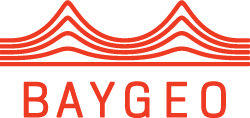
BayGeo’s Remote Sensing
Interpret and analyze satellite and aerial imagery for environmental and spatial data applications

Learn to use remote sensing tools and workflows to understand remote sensing properties, technologies, and analysis capabilities.
Earn a certificate in Remote Sensing Basics, Uses, and Applications designed to introduce you to the fundamental principles and techniques of remote sensing. This course covers the properties of remote sensing, key technologies, and practical workflows. You'll learn to interpret and analyze satellite and aerial imagery, gaining skills that can be applied in environmental monitoring, urban planning, agriculture, and other fields. By the end of the course, you will have a solid foundation in remote sensing, empowering you to leverage this powerful technology in your professional projects.
Learning Outcomes
By completing this certificate, you will be able to:
- Perform intermediate workflows including creating interpolated surfaces from vector data.
- Create your own vector data.
- Perform image analysis such as generating NDVI to map vegetation characteristics.
- Perform land use classification and detect land cover change in both rural and urban environments.
- Analyze city microclimate environments by mapping shade.
Course Offerings
This Fall, we have two offerings: Remote Sensing with Google Earth Engine and Remote Sensing with ArcGIS Pro. Both courses will equip you with practical skills tailored to your specific needs and interests.
-
This course introduces the basics of radar remote sensing and interpreting Synthetic Aperture Radar (SAR) images. Learn the preprocessing steps of a SAR image and analyze the data. Understand how SAR images play a critical role in flood and forest mapping and learn the process. Get hands-on experience with Sentinel Application Toolbox (SNAP) and Google Earth Engine for SAR image processing, analysis and application.
Software
You will need a laptop with internet access to participate in this course. Google Earth Engine is a cloud-based platform, so no additional software installation is required. All registered students should have a Google Earth Engine account before class. Contact your instructor if you have questions about how to get this account.
Details
Dates: TBD
Location: In person at USF
Instructor: Preethi Balaji
Continuing Education Units: 1
Cost: $375 ($225 for BayGeo members, USF students or alumni) -
This certificate covers intermediate tools and workflows within ArcGIS Pro. You will develop a solid understanding of remote sensing properties, technologies, and analysis capabilities, enhancing your ability to perform comprehensive spatial analysis and imagery interpretation using ArcGIS Pro.
Software
You may bring your own laptop or use the computers in the University of San Francisco’s Geospatial Analysis Lab. All registered students will receive a temporary ArcGIS Pro license.
Details
Dates: October 21 - November 4, Mondays 6-9 p.m.
Location: In person at USF
Instructor: Jake Dialesandro
Continuing Education Units: 1
Cost: $375 ($225 for BayGeo members, USF students or alumni)Instructor
Jake Dialesandro is a Lecturer of Remote Sensing, GIS, and Environmental Statistics in Santa Clara University’s Environmental Studies Department. Prior to SCU, Jake was a postdoctoral research fellow using remote sensing and geospatial data to solve urban climate and environmental justice issues at the University of California Los Angeles Luskin Center for Innovation. He recently graduated with a Ph.D. in geography from UC Davis with a focus on urban climatology and remote sensing. Before joining the Geography Graduate Group at UC Davis, Jake was a geospatial research analyst for two years with the USDA Southwest Climate Hub in Las Cruces, New Mexico at the Jornada LTER Research site where he studied climate change impacts in agriculture and snowpack in the southwestern U.S. Jake also served five terms with NASA DEVELOP as an assistant center lead and project lead at the Tempe, Arizona and Pocatello, Idaho nodes. He holds a Masters of Applied Geography degree from New Mexico State University and a Bachelor's degree in GIS from Kent State University.

The University of San Francisco Geospatial Analysis Lab and BayGeo’s GIS Education Center, a geospatial non-profit organization in the San Francisco Bay Area, have designed a geospatial certificate program to offer a skill-based curriculum that addresses the industry's latest technologies.
Take the Next Step
Whether you're a professional seeking to enhance your GIS expertise or a beginner eager to explore the field, you'll gain hands-on experience and invaluable insights to stay ahead in the dynamic geospatial landscape.